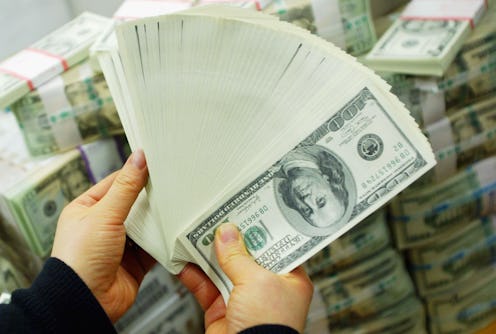News
This Gender Pay Gap Court Ruling Is Excellent News Ahead Of Equal Pay Day

Just one day before Equal Pay Day, a federal appeals court ruled that the gender pay gap can't be justified by employees' prior salaries. While the Equal Pay Act of 1963 does allow for pay discrepancies based on factors other than gender, the 9th Circuit Court of Appeals said on Monday that the loophole doesn't include pay history. Judge Stephen Reinhardt wrote in the court's opinion that allowing employers to factor in an employee's previous wages would "capitalize on the persistence of the wage gap and perpetuate that gap."
The case centered around Aileen Rizo, a math consultant in California who sued the Fresno County superintendent in 2012 upon discovering that she was making less money than her male peers. The Fresno County Office of Education argued in court that it had the right to pay Rizo less for the same work because she was taking home less money at her previous job. The court ultimately ruled in Rizo's favor, however.
"The financial exploitation of working women embodied by the gender pay gap continues to be an embarrassing reality of our economy," the late Judge Reinhardt wrote in the opinion. He added that the court took on the case to clarify that "prior salary alone or in combination with other factors cannot justify a wage differential."
Reinhardt died on March 29 at the age of 87, but had already completed the court's opinion in favor of Rizo. He is also known for his part in blocking California's proposed ban on same-sex marriage in 2012.
The late judge's opinion on the gender wage gap will have the same lasting effect. He didn't simply explain why female employees' prior salaries don't justify current pay discrepancies — he lamented that the Equal Pay Act hasn't yet closed the gender wage gap after 55 years:
"The wage gap between men and women is not some inert historical relic of bygone assumptions and sex-based oppression. Although it may have improved since the passage of the Equal Pay Act, the gap persists today... If money talks, the message to women costs more than 'just' billions: women are told they are not worth as much as men."
Issues with pay history have slowly crept into the spotlight in recent years. In fact, New York City prohibited employers from asking about past wages during the hiring process last year. New York's First Lady Chirlane McCray told Bustle at the time that the measure sought to stop gendered pay discrepancies from following women their entire careers:
"For too long, women and people of color have been underpaid and undervalued in the workplace. It is only natural that we would turn our attention to closing the wage gap and leveling the playing field for New Yorkers at this time when so many women and people of color are in such severe economic strain."
As Reinhardt noted in his opinion, a woman's previous low salary could have been because of her gender, so basing her future salary off of it would only perpetuate the wage gap. Moreover, allowing employers to justify lower wages for women due to their pay history would be antithetical to what the Equal Pay Act sought to achieve.
"The Equal Pay Act stands for a principle as simple as it is just: men and women should receive equal pay for equal work regardless of sex," the court's opinion reads. "Salaries speak louder than words."
Equal Pay Day on Tuesday will mark the extra three months American women must work to earn the same amount as men in a given year. The average woman currently takes home about 80 cents for every dollar a man is paid, while women of color take home even less. But this week's 9th Circuit Court of Appeals ruling determined that it's unconstitutional for companies to sustain that gender wage gap when hiring.